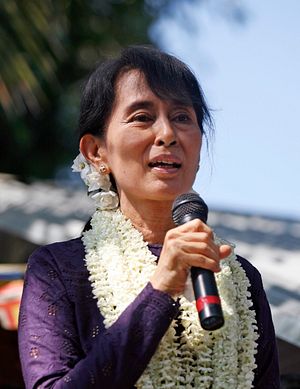On November 8, Myanmar held general elections, a milestone in the promised process of democratization and political reform. Early results indicate a landslide victory for the National League for Democracy (NLD), the party led by former political prisoner Aung San Suu Kyi. The Diplomat speaks with Joshua Kurlantzick, a senior fellow for Southeast Asia at the Council on Foreign Relations, about what to expect from Myanmar’s new government.
The Diplomat: How well-equipped do you think the NLD will be to actually govern Myanmar, particularly given that many top political positions are still reserved for military officials? Conversely, how will the current regime respond to losing power?
Joshua Kurlantzick: I think the current regime is only partially losing power. The top ministers in the Thein Sein government have been gracious so far, in part perhaps because they want to curry favor with the next government. The USDP as a whole has been relatively gracious. However, many of the senior members of the USDP are going to retain significant influence through their ties to active and retired military. I think the NLD is in position to govern moderately effectively, but it might have helped if Thura Shwe Mann [speaker of the lower house of parliament and formerly head of the USDP] was actually popular, had been able to win an MP seat to demonstrate his popularity, and could have been a decent compromise choice for president.
What are the prospects for economic reform under the new government? Will the NLD be able to make progress on structural issues?
I don’t know that the NLD is in a better position to make progress on structural issues. They may be, since it may be easier to make challenging and potentially unpopular decisions with a legitimate mandate. On the other hand, sometimes it becomes harder to make major decisions in young democracies, as interest group politics slows the approval process. The NLD also will need to co-opt some of the exiles who worked for the previous government, which I think may well happen.
How might an NLD-led government change Myanmar’s foreign policy approach, particularly in its relationships with China, India, and the United States?
I think the NLD will probably maintain the foreign policies of the Thein Sein government. Suu Kyi may get a warmer welcome in Washington, but Thein Sein already got a pretty warm welcome. Other leading democracies — most importantly, Japan — have already embraced Myanmar and its reforms.
The NLD does not have a ton of experience in thinking about policy about important neighbors like China and Singapore, but it is beginning to do so. Singapore’s leaders will be comfortable with Suu Kyi; they want to see stability and democratic legitimacy could provide that. It’s unclear what China’s view is; the fact that they may be undermining some of the ceasefire negotiations suggests Beijing is trying any way possible to ensure it has the most leverage in Myanmar. Suu Kyi has long and old ties to India, but India’s foreign policymakers do not know her that well.
I think important Muslim-majority nations with influence, like Indonesia and the Gulf states, will be disappointed to see little change in the government policies toward the Rohingya.
Suu Kyi is constitutionally banned from acting as president, but has said she will be “above the president”when it comes to leading the NLD government. What do you think her role will be in Myanmar in 2016 and beyond?
I think we should take Suu Kyi at her word on this, and assume that, no matter who is president, she intends to be the driving force behind policymaking, as well as the person in control of the NLD.
What does Myanmar’s political evolution to date say about the U.S. approach to human rights and democracy in Southeast Asia under the Obama administration?
I think we need to be humble about the U.S. role. The U.S. played a role — since the United States had led the sanctions effort, rapprochement led to many other democracies dropping sanctions, investing in Myanmar, and helping spur reform. That is the biggest difference the U.S. made. The United States’ role was quite limited in promoting reform, though.
Also, I’m not sure Myanmar policy is consistent with U.S. policy elsewhere in the region, where the U.S. has maintained close relations with governments, like Malaysia, that have overseen regressions on rights and freedoms.

































